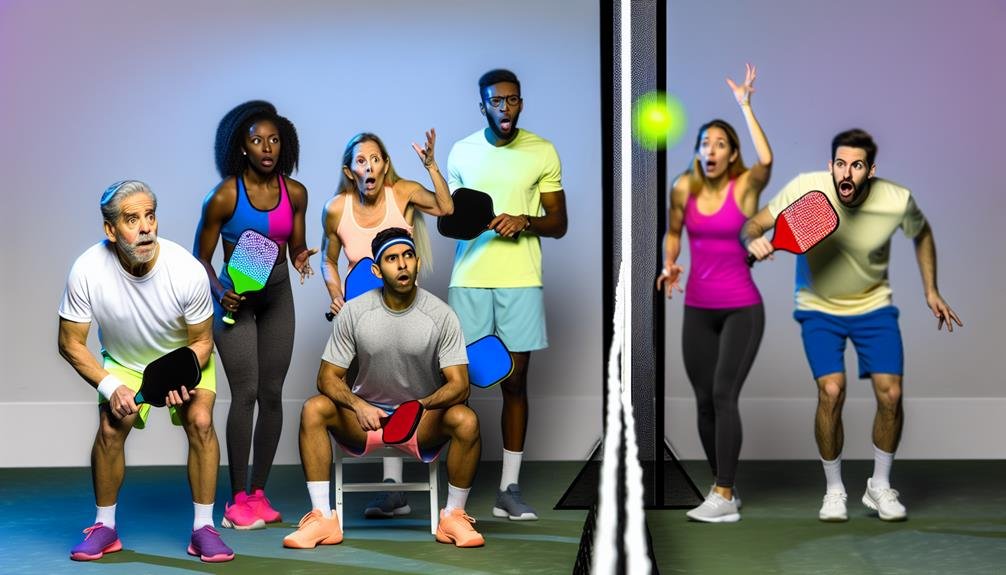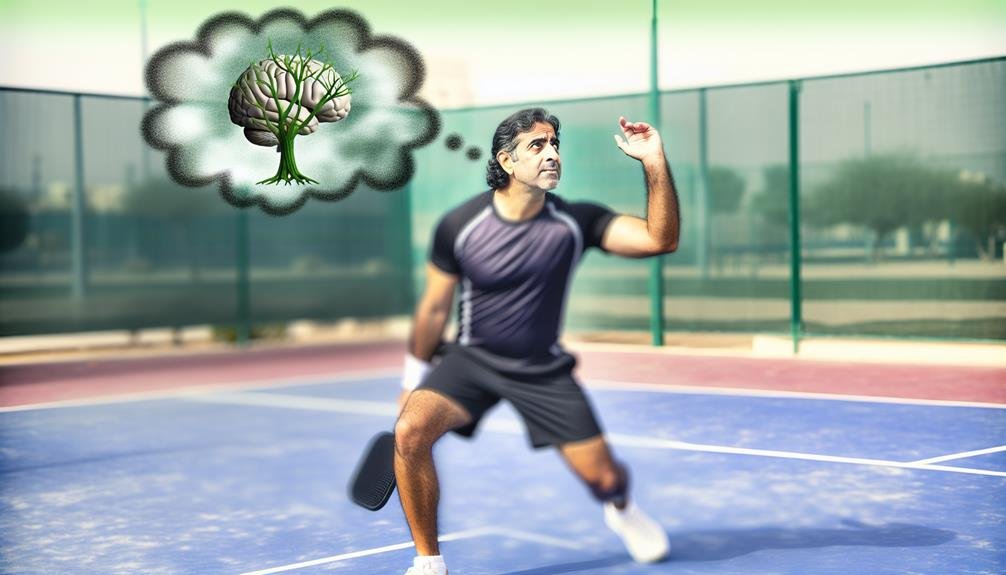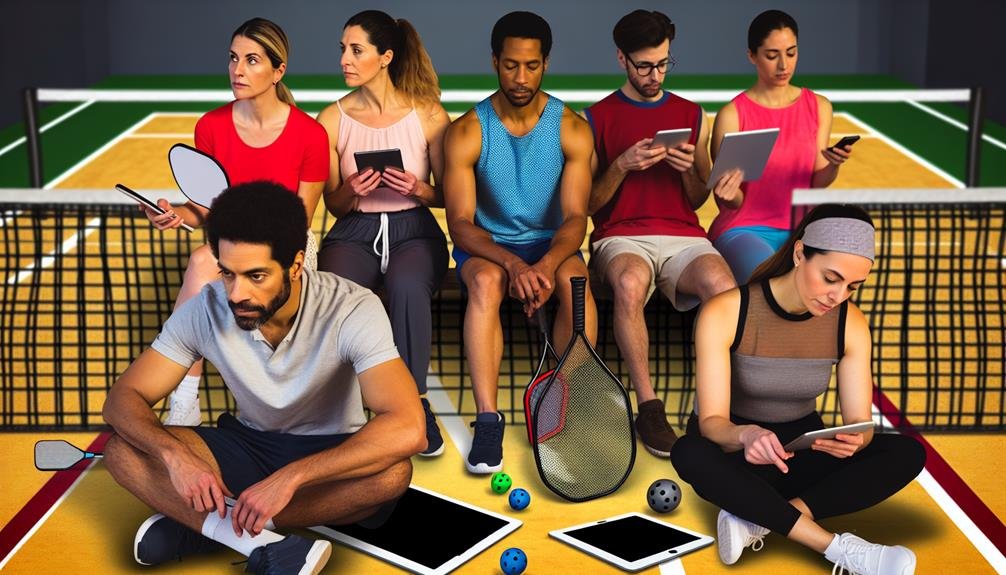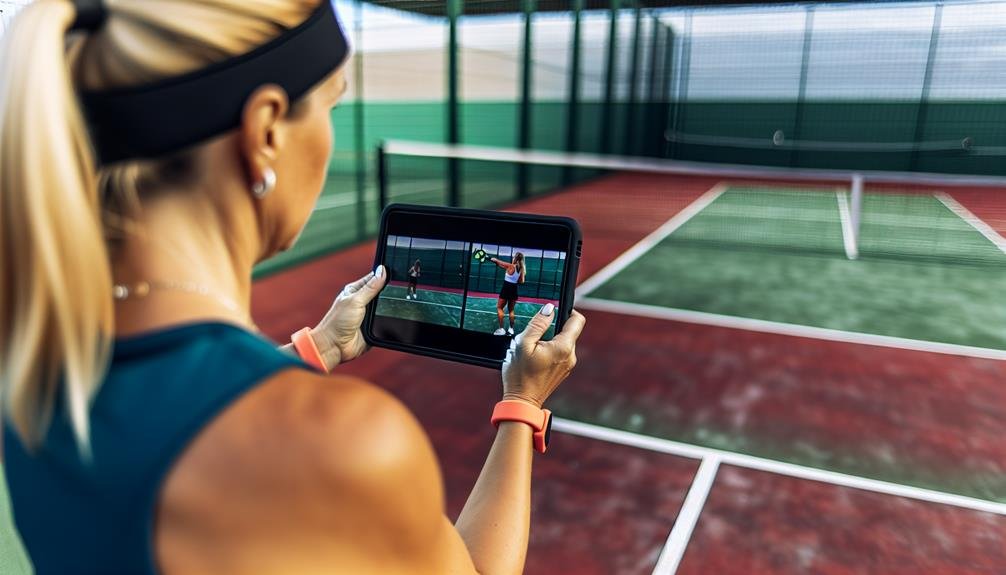Mastering pickleball involves more than just skill development; it requires effective management of unsolicited advice from sideline observers. Implementing an 'Advice Filter' is crucial for maintaining focus and optimizing performance. Players should redirect well-meaning feedback towards specific areas, such as kitchen line monitoring or shot-calling. Setting clear boundaries with inexperienced advisors is essential, as is prioritizing guidance from credible sources like certified coaches or seasoned players. Developing a growth mindset allows for receptiveness to constructive criticism while maintaining discretion. Video analysis and online resources can provide valuable tools for self-improvement. By applying these strategies, players can silence the sidelines and accelerate their path to pickleball perfection.
Key Takeaways
- Implement an effective 'Advice Filter' to maintain focus and optimize performance during gameplay.
- Redirect well-meaning observers by assigning specific tasks like kitchen line monitoring or shot-calling.
- Set clear boundaries with inexperienced advisors while prioritizing guidance from credible sources like coaches.
- Develop a growth mindset to balance receptiveness to constructive criticism with discretion in accepting advice.
- Utilize video analysis to identify areas for improvement and create targeted practice routines.
The Unsolicited Advice Dilemma

Countless pickleball players grapple with the challenge of managing unsolicited advice on the court, which can be both distracting and counterproductive to their game improvement efforts.
Implementing an effective 'Advice Filter' is crucial for maintaining focus and optimizing performance. To mitigate this issue, players should redirect free coaching towards specific areas such as kitchen line monitoring or shot-calling, effectively channeling peer feedback into actionable insights.
Setting clear boundaries with inexperienced advisors is essential, as is prioritizing guidance from credible sources like coaches or seasoned players.
Developing a growth mindset allows for receptiveness to constructive criticism while maintaining discretion. By asking for specific guidance on etiquette or rules, players can preemptively steer conversations away from unsolicited advice.
This strategic approach to managing input enables players to cultivate a more focused and productive learning environment, ultimately enhancing their pickleball skills and enjoyment of the game.
Redirecting Well-Meaning Observers
Effectively redirecting well-meaning observers is a crucial skill for pickleball players seeking to maintain focus and optimize their performance on the court.<|start_header_id|><|start_header_id|>assistant<|end_header_id|>
Effectively redirecting well-meaning observers is a crucial skill for pickleball players seeking to maintain focus and optimize their performance on the court.
To manage free advice,<|start_header_id|><|start_header_id|>assistant<|end_header_id|>
players can employ strategic techniques to channel unsolicited input constructively.<|start_header_id|><|start_header_id|>assistant<|end_header_id|>
One effective approach is to stop getting unsolicited advice by asking for specific guidance on etiquette or rules,<|start_header_id|><|start_header_id|>assistant<|end_header_id|>
thereby directing observers' attention to areas where their input may be more valuable
Setting Boundaries With Amateur Coaches

Implementing effective boundary etiquette is crucial for managing unsolicited advice from well-meaning but inexperienced players.
Begin by politely acknowledging their input, then redirect the conversation to specific aspects of the game where their expertise might be valuable, such as monitoring the kitchen line or calling shots.
Employ coach filtering techniques by evaluating the credibility and experience of those offering advice.
When faced with persistent amateur coaches, respectfully explain your preference for focusing on your own game or learning from established professionals.
Develop a strategy for gracefully declining unsolicited coaching, such as expressing gratitude for their interest while emphasizing your commitment to your current training regimen.
Identifying Credible Information Sources
Distinguishing credible information sources in the world of pickleball requires a discerning approach and careful evaluation of the expertise behind the advice. When seeking reliable guidance, consider the following factors:
| Source Type | Credibility Indicators |
|---|---|
| Coaches | Coaching Credentials, Tournament Experience |
| Players | Competitive Record, Years of Play |
| Media | Expert Contributors, Fact-Checking Practices |
Prioritize information from certified coaches, professional players, and reputable pickleball organizations. Verify the credentials of instructors and the competitive history of players offering advice. Seek out Pickleball Podcasts hosted by experienced players or coaches, ensuring they feature guests with proven expertise. Cross-reference information across multiple credible sources to validate accuracy. Be cautious of advice from players with limited experience or unverified credentials. Continuously update your knowledge base by following trusted industry publications and attending clinics led by recognized experts in the field.
Developing a Growth Mindset

Cultivating a growth mindset is essential for pickleball players seeking continuous improvement and adaptability in their game.
This approach to personal development emphasizes Mindful Learning and Personal Accountability, enabling players to embrace challenges and view setbacks as opportunities for growth.
To foster a growth mindset in pickleball, consider the following strategies:
- Embrace constructive feedback as a catalyst for improvement
- Set process-oriented goals rather than focusing solely on outcomes
- Celebrate effort and progress, not just natural talent or victories
Questioning the 'Why' Behind Advice
Many pickleball players fail to question the rationale behind advice they receive, potentially hindering their ability to critically evaluate and apply new information effectively. To overcome this, players should adopt a systematic approach to questioning advice, focusing on understanding the 'why' behind each recommendation. This process, crucial for Silencing the Sidelines, involves three key steps: asking probing questions, analyzing the source's credibility, and evaluating the advice's applicability to one's game.
| Step | Action | Benefit |
|---|---|---|
| 1. Ask | Inquire about the reasoning | Understand underlying principles |
| 2. Analyze | Assess advisor's expertise | Gauge reliability of information |
| 3. Evaluate | Consider relevance to your play | Determine potential impact |
| 4. Apply | Implement selectively | Improve game strategically |
Verifying Information From Multiple Sources

After questioning the 'why' behind advice, the next step in developing a discerning approach to pickleball guidance involves verifying information from multiple sources.
Source validation is crucial for ensuring the accuracy and reliability of the information you receive.
Implement a rigorous fact-checking process by:
- Cross-referencing advice with reputable pickleball resources
- Consulting experienced players or certified coaches
- Analyzing video footage of professional matches
Investing in Professional Coaching
Professional coaching represents a pivotal investment in one's pickleball journey, offering targeted instruction and personalized feedback to accelerate skill development and strategic understanding.
When seeking a coach, prioritize those with robust credentials, including competitive playing experience and a track record of successful student outcomes. Evaluate potential coaches based on their training methods, ensuring they employ innovative techniques such as video analysis, biomechanical assessments, and data-driven performance metrics.
Effective coaches tailor their approach to individual player needs, focusing on areas like shot selection, court positioning, and mental preparedness. They should demonstrate proficiency in breaking down complex skills into manageable components and provide actionable feedback for improvement.
Additionally, look for coaches who stay abreast of emerging trends in pickleball strategy and equipment technology, as this knowledge can provide a competitive edge. Ultimately, investing in professional coaching can significantly expedite progress and elevate overall gameplay.
Self-Analysis Through Video Review

Video analysis stands as a powerful tool for pickleball players seeking to elevate their game through systematic self-evaluation and targeted improvement. By leveraging game footage, athletes can conduct a comprehensive personal critique of their performance, identifying strengths and weaknesses with unprecedented clarity.
Key benefits of video analysis include:
- Objective assessment of technique and strategy
- Identification of subtle errors in positioning and shot selection
- Visualization of improvements over time
This innovative approach allows players to dissect their gameplay frame-by-frame, revealing nuances that may go unnoticed during live play. By scrutinizing their footwork, paddle angle, and court positioning, athletes can pinpoint areas for refinement and develop targeted practice routines.
Moreover, reviewing game footage enables players to analyze their decision-making processes and tactical choices, fostering a deeper understanding of game strategy.
Ultimately, video analysis empowers pickleball enthusiasts to accelerate their skill development and achieve performance breakthroughs.
Leveraging Online Pickleball Resources
In today's digital age, pickleball enthusiasts can tap into a wealth of online resources to enhance their skills, strategies, and understanding of the game. Leveraging these digital platforms offers innovative ways to improve performance and connect with fellow players.
| Resource Type | Benefits | Examples |
|---|---|---|
| Video Tutorials | Visual learning, technique analysis | YouTube channels, coaching websites |
| Pickleball Communities | Peer support, knowledge sharing | Facebook groups, Reddit r/pickleball |
| Online Forums | Strategy discussions, equipment reviews | PickleballForum.com, Talk Pickleball |
| Mobile Apps | On-the-go learning, skill tracking | Pickleball Stat Tracker, Pickleball Coach |
Conclusion
In the pursuit of pickleball perfection, players must navigate a cacophony of unsolicited advice.
By implementing strategic filters and focusing on credible sources, enthusiasts can cultivate a more efficient learning environment.
Developing critical evaluation skills, investing in professional coaching, and utilizing self-analysis tools form the cornerstone of continuous improvement.
As players silence the sidelines and chart their own course, they unlock the potential for true mastery, transforming from mere participants into architects of their own pickleball destiny.

